The Creative Process #43 - Background Work
A peek into making a piece of art, and where I'm heading to next in my projects.
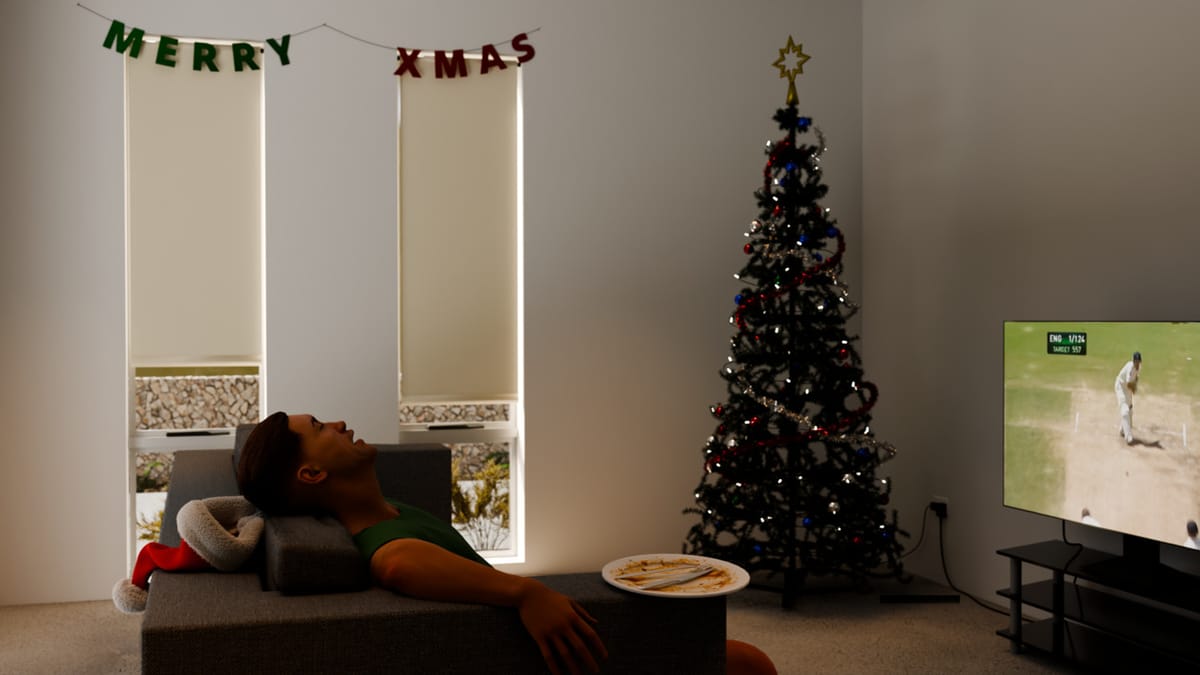
Every year I try to do a Christmas picture in Blender 3d. One reason for doing this is so that every year I do at least one piece of 3d art. The other is that it's just a nice tradition of my own - it's not Nodevember, it's not a jam. It's just me.
I would have included it in my yearly wrap-up last newsletter except that I hadn't finished it! The Christmas period was too busy for me. I did, however, finish it in the first week of January, so it still vaguely counts.
With these pieces I always try to do something achievable, but include a little something technical that I think I can do, but it stretches me. 2024's picture emulated a time-lapse of a sparkler.
I thought it might be interesting to walk through the picture's creation. I'm no Blender expert, but am slowly acquiring skills and solving problems.
Outline
I wanted something Christmassy and Australian. In previous years I did a tinsel-wrapped surf board on the beach, a sand globe of a house in the deep Outback covered in lights, and a sparkler at twilight writing the words "Merry Xmas" in time-lapse. Australian Christmas is a paradox of being extremely hot and sunny, but having certain trappings of a Northern Hemisphere Christmas. Our family does a roast lunch with cold desserts, with presents in the morning and hopefully a post-prandial nap in the afternoon. Boxing Day (the day after Christmas) is in some ways an equal holiday in Australia. There's the Boxing Day test cricket, and in my family there was usually a big seafood lunch, drinks, swimming and street cricket.
This year I really wanted to capture that nap. As a kid it was the time for you to retreat to your room and investigate all the presents you got. As an adult I dream of having the ability to snooze on the couch, in the silence, after a delicious meal. This year's picture is that dream.
I flicked between a few ideas: a simple animation of a camera pan across a lounge room showing the different elements of a Christmas tree, sleeping father, cricket on the TV and the remains of a roast dinner. And before you protest, yeah there's often not cricket on the TV on Christmas day itself, but I don't care. The camera pan posed a bunch of problems of animation, scale of objects, having video of cricket... A few years ago I had attempted a similar idea with camera pan of a fantasy bank vault heist aftermath. It took a vast amount of effort and it didn't come out so good. So I attempted to get it all as a single picture.
When bored on a drive home from work I asked ChatGPT to brainstorm the picture for me. ChatGPT didn't particularly help, but saying the things out loud at least helped me.
Reference and Design
The idea was a couch, in a lounge room, a Christmas tree in a corner, a TV, and some way to show the outside. I modelled the room after our own lounge room and took a bunch of reference pictures, especially of our Christmas tree. I got my tape measure out to get a sense of scale. I didn't take detailed measurements of things like the window placement, because I wanted some flexibility there.
I found reference documents for our flat screen TV, so I could get the dimensions of that. The couch I mostly eyeballed.
Our Christmas tree is a plastic one that folds up and I wanted exactly that. I noted how many "levels" of branches it had, how many branches per level, roughly how many sticks per branch... All those sorts of statistics.
I didn't take any reference for the plate or cutlery, which bit me later when I wondered why they looked so weird.
Blocking out
I've learned previously that it helps to block out a scene to get a sense of where everything is and troubleshoot before you dive into details.
The room began as a cube, inverted and scaled up. I cut out two spaces for windows without giving it any thickness. The Christmas tree was a cone, the couch was a rectangular prism, and the TV and stand were boxes.
I don't make my own humans, I use an add-on called HumGen3d that makes procedural humans. I added one into the scene to make sure I had the human scale correct - which was good because the couch was too low.
I'm not confident enough to choose a picture aspect ratio that isn't 16:9. My main composition rule is Rule of Thirds, so I moved everything around until I had the Christmas tree along one third, the bottom intersection of thirds near where I was going to have the sleeping guy's head, and shuffled the camera around until it all aligned correctly.
At this point I added a special null to the camera so it could point (and focus) on the right part of the image without me having to adjust the angle. I could just move the camera or move the null.
Modelling
I'm not a very good modeller, but I do what I can, especially in these images. I started on the TV stand first, trying to emulate ours. Same with the TV. I knew I could avoid most of the detail work like plugs and ports, so the TV was mostly extruded/scaled boxes.

The only tricky bit with the TV was that I had a glass front and the display behind it to give a sense of physicality. It's a tiny detail, though.
The couch came next and started as a prism that I carved into. To give a sense of comfort I slightly puffed the middle of each face up and rounded the edges. The cushions themselves were cubes shaped into place. You can see one of them is vastly more complex than the other. I had tried to sculpt it to look like it was squished by the guy. To get the small wrinkles you need a fine mesh. Later on it turns out I didn't need that, but I was too far in to replace the cushion.

Next was the trickiest part of the whole thing: the Christmas tree. I actually tried this a few times. It's entirely modelled procedurally, so the tree actually starts like this:
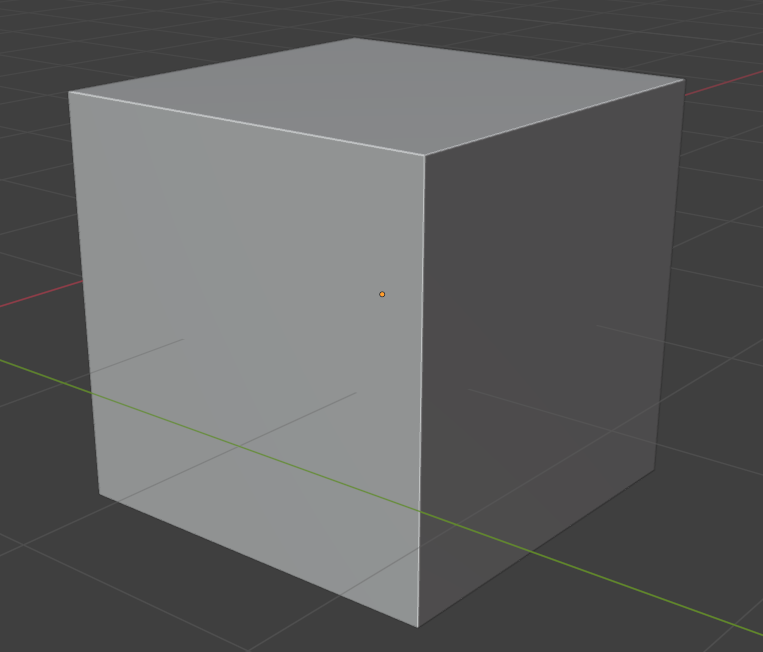
But then I use geometry nodes to produce:

This doesn't include all the baubles and tinsel, nor the wires sneaking to the power points.
The geometry nodes setup is complex. It's built up in stages:
- Base and core trunk.
- A level of the tree has a number of branches, as well as a central collar for them to come out of.
- Each branch has a little thick bulb of string (here just an elongated blob) and then a number of bendy arms coming out.
- On each bendy arm there are tiny plastic leaves sticking out like hair.
In Blender the first level looks like this:
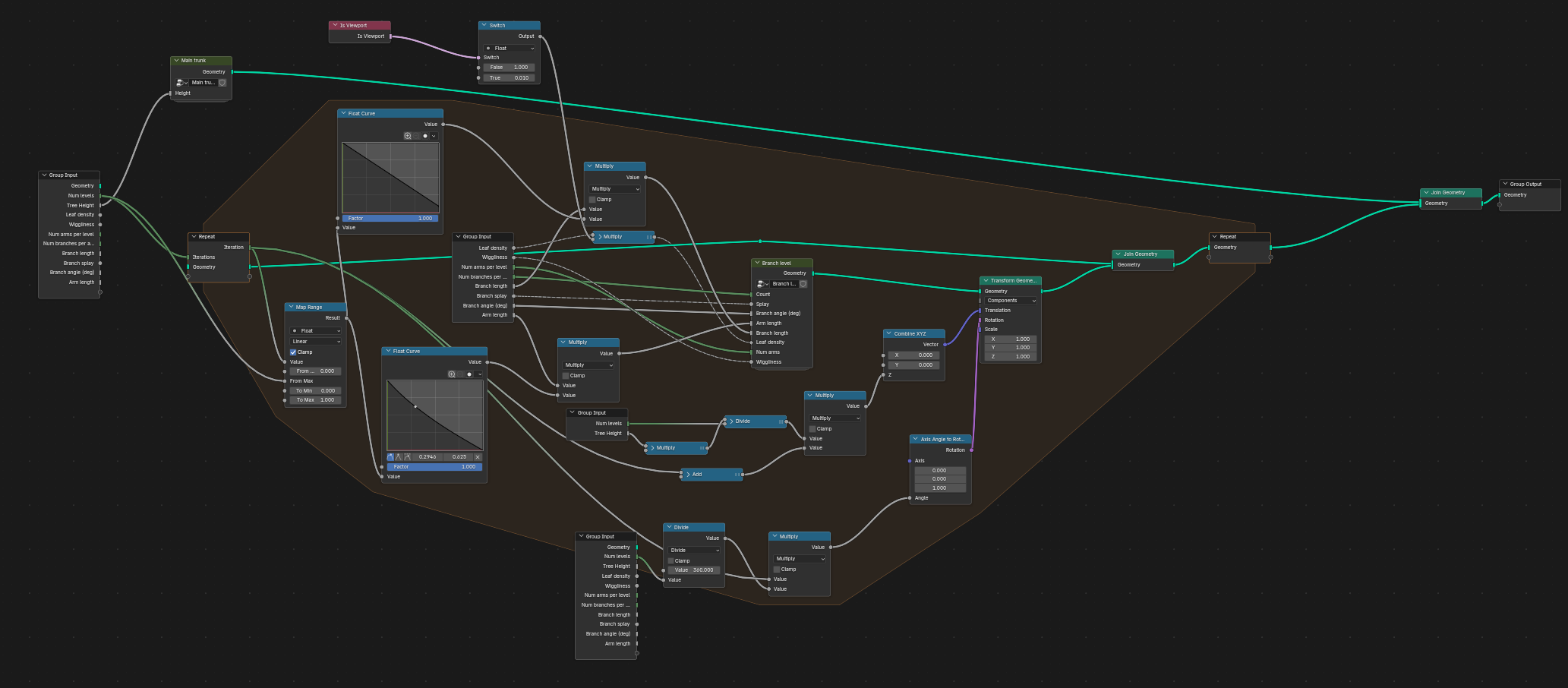
One layer down:
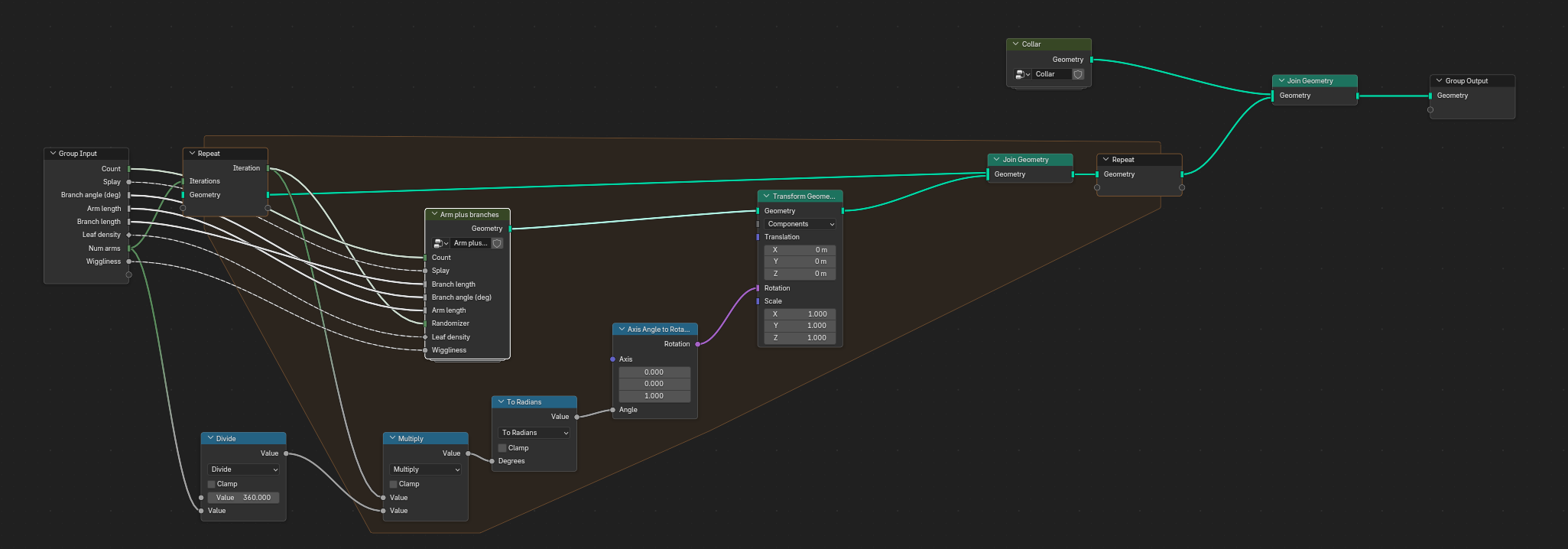
A lot of the complexity is building in the capability to control the tree without editing the nodes directly:
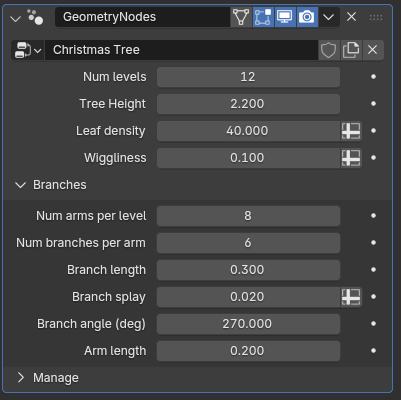
This was useful as the tree looked very sparse during development. It still does, but appropriate to the plastic tree aesthetic, I think.
One technical challenge I overcame was that each branch is unique. Normally if you have an array of things in geometry nodes, they all come out the same. Baking in differences in the geometry - especially with curvy objects - takes some trickery.
The other elements of the scene were very basically modelled with little technical work. The baubles just distribute some procedural spheres on an invisible cone. If you look very carefully some don't hang off branches. The tinsel is a spiral cone with a little added wiggliness - it doesn't actually drape on the branches.
The plate was a simple flat cylinder with an inset face, all tweaked to give you that plate look. The cutlery are subdivision surfaces, which means they are actually blocks with strategic edges put in so when you get the computer to turn it into nice curves, everything looks right.


Actual blocky model vs render
Outside the window I added a very basic garden, driveway and rock wall. The plants outside were free plant assets.
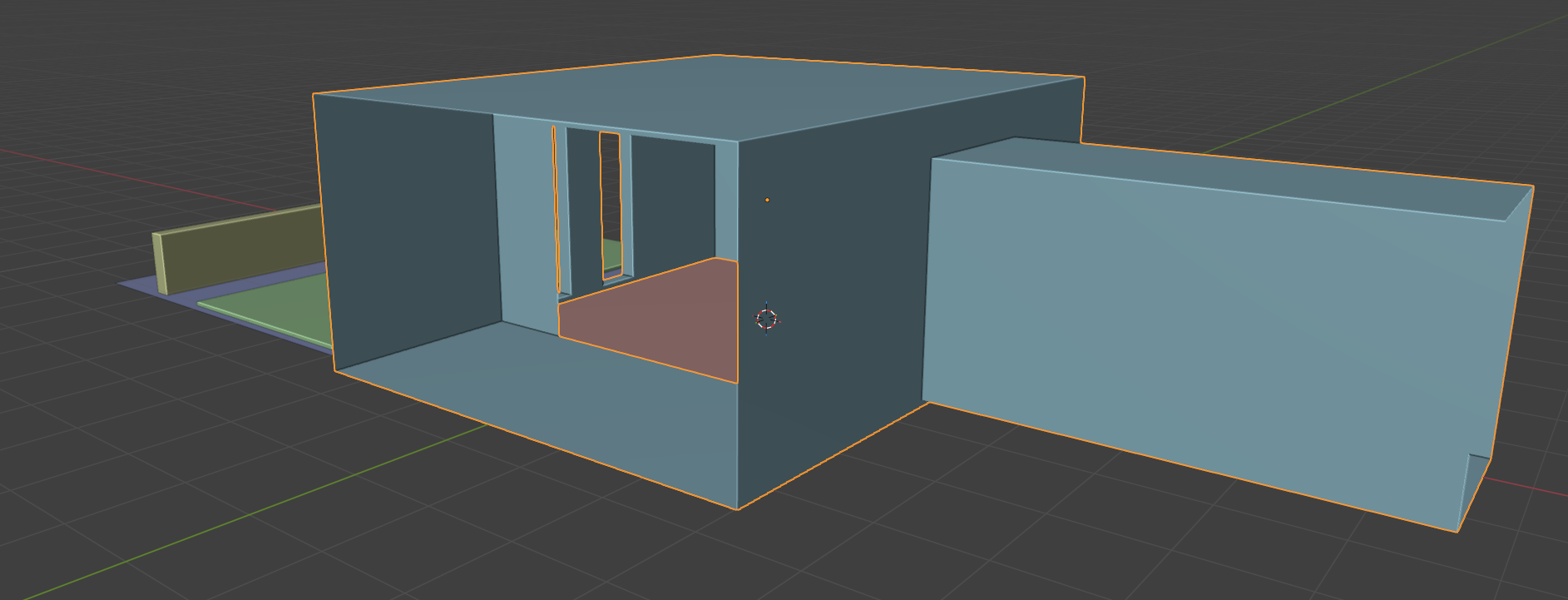
One strange thing you'll notice is outside the lounge room is a half hallway to the left and a long hallway in the back wall on the right of the picture. The left is the entrance but it brings in some sunlight (bounced and semi-direct). The right "hallway" is because the ideal place for my camera was inside the back wall! Pulling the wall back messed with the light levels in the room, so I just punched a hole in the wall and brought the camera back.
At this point I was also positioning the sun. There's a neat page called SunCalc that will calculate the position and direction of the sun based on latitude/longitude. I picked my place in the afternoon on Christmas, so it's fairly accurate. I did rotate my entire house to get the angle of light coming through the windows that I wanted.
The sunlight is most of the light in the scene. The TV provides some, and there's some hidden ceiling lights. The lights on the tree appear to contribute very little.
I chose a very high contrast colour management profile because I knew I was dealing with bright sun and dim room.
The dangling sign was a little tricky to make the correct catenary curves (there's a default hidden in Blender) and then position the text on them. I wanted to put holes in them and thread the wire through, but that wasn't worth it. There's actually tiny pushpins at the right places, but you cannot see them.
The blinds are a series of modelling crimes. It's very hard to do rolled, thin surfaces, so I faked it and managed to hide the irregularities.
The windows are easily modelled prisms, and I avoided most of the actual details there.
Texturing
Most of the texturing was from free texture sites like AmbientCG, including the HDRI lighting/image I use for the outside environment.
The cricket image I took from a screengrab midway through December. I don't think it's a notable game.
I had a funny time with the windows. I wanted them to be a little dusty, which I did, but that turned the indoor lighting dramatically tan, and the effect I was looking for didn't show up at all. I think in the end I removed most of that.
If you just place a TV and place the picture on the screen it looks like a poster. If you make it emit light, it looks better but still kinda "printed-on". I used some shader trickery with Fresnel effects to give it a different washed-out look depending on angle, like you do with LED screens. It's subtle but I think makes the TV more natural.
First draft
I then finished up my first conception for the scene. I put a human in, posed him to be lying down, and meticulously sculpted a blanket over him, the narrative being that the aircon was cold enough for a thin blanket.
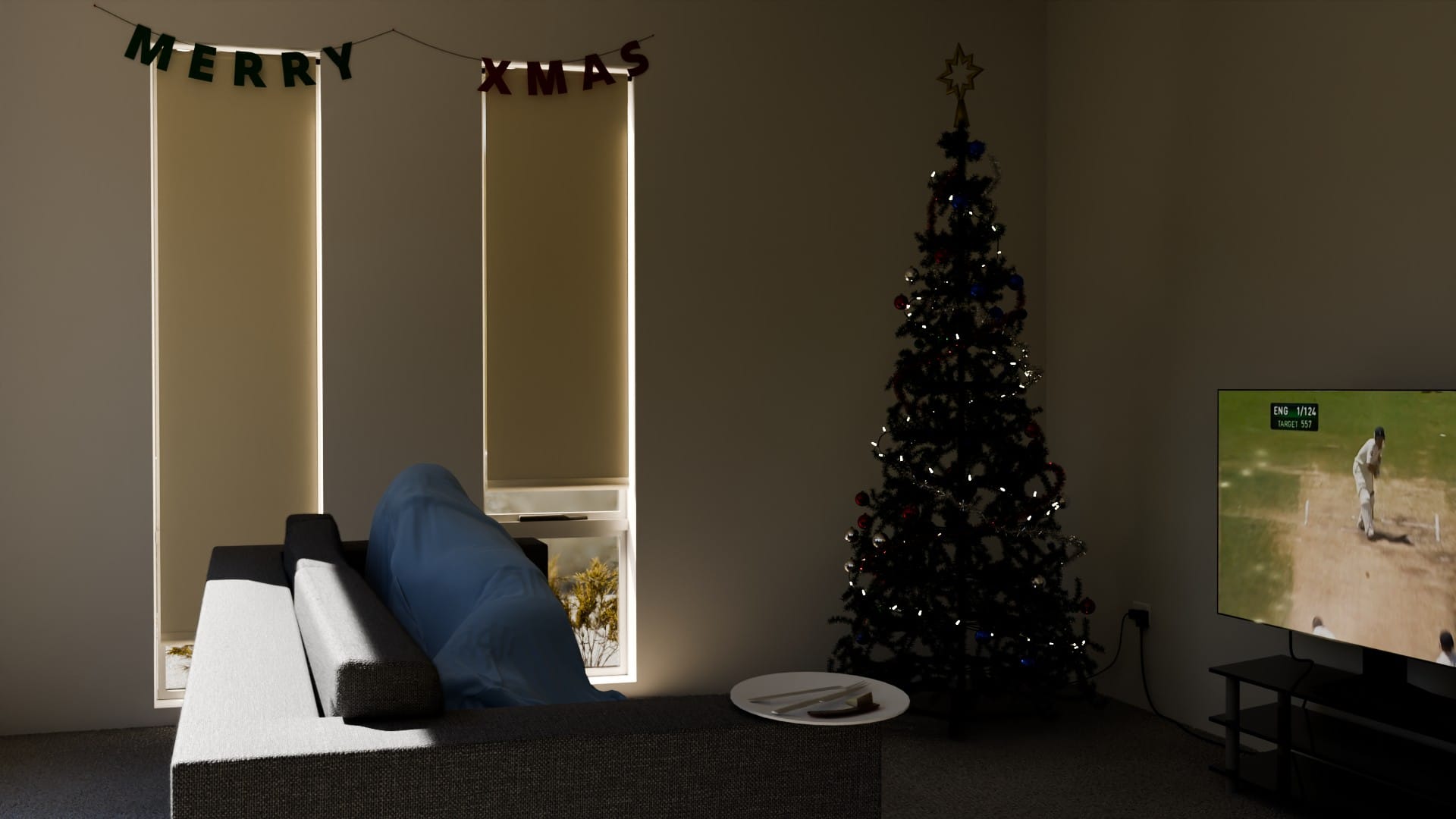
I showed this to my art friends and they couldn't quite read that it was a dude sleeping on the couch. The outside was blocked off too much. The plate of food looked goofy and did not read at all like leftover roast meat and potato. The lights on the tree were too regular.
Second and further drafts
So I adjusted some things. I lifted a shade up and had the dude sprawled asleep more in the foreground. I played with the depth-of-field as well (perhaps too much).
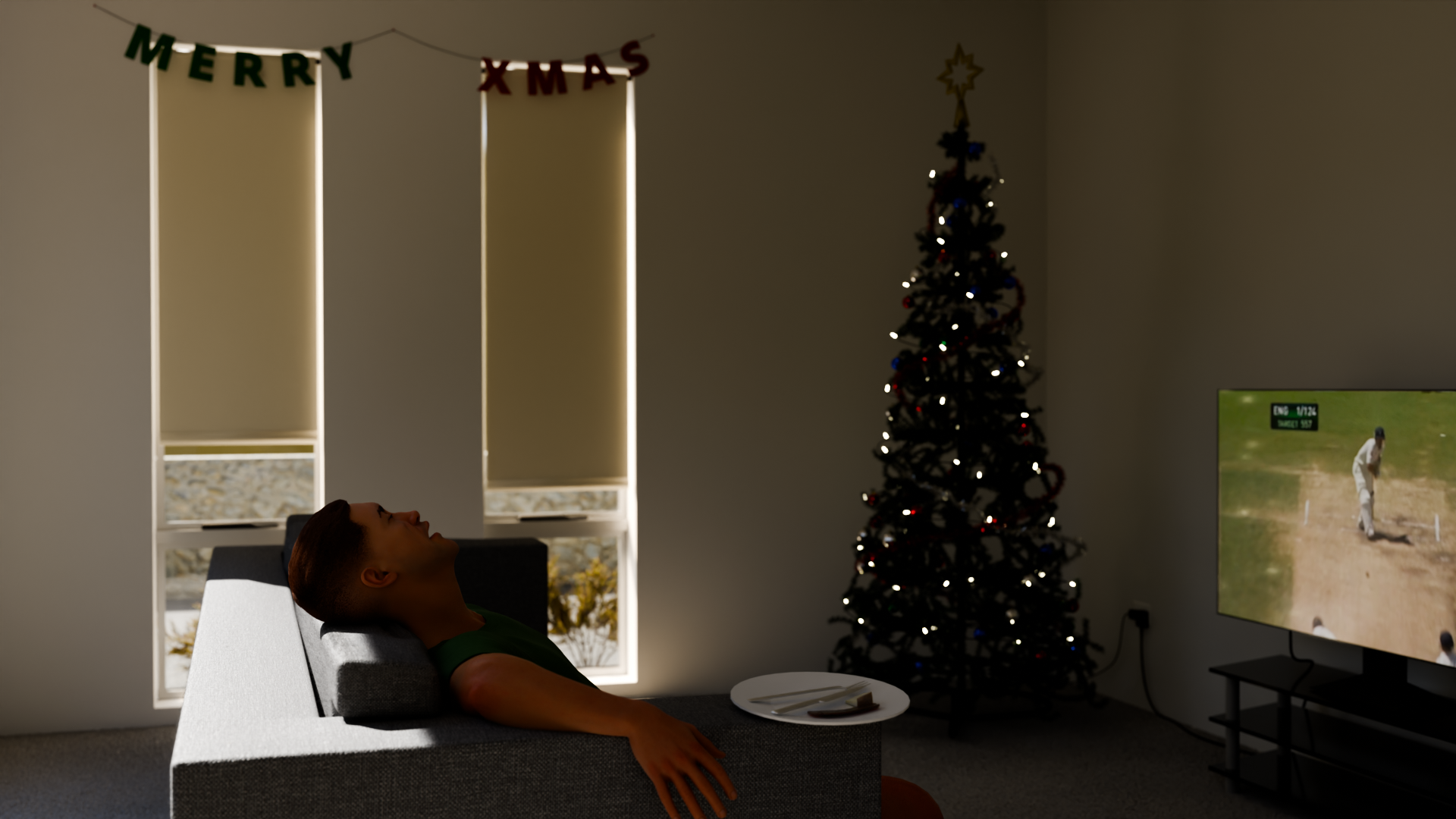
Still no good, so I tried to solve the dinner plate. I threw out the PS2-era food and tried to make a messy plate. I could not find a good texture anywhere. Turns out ChatGPT could make a passable go at a gravy-smeared plate texture. And it could even produce a bump map!

This is also where I got into physics and hair. To break up that block of light on the back of the couch and emphasise Christmas, I modelled a simple Santa hat. With some careful texturing I made the fluffy bits fluffy with a hair simulation and the red bits were satin. It took an incredible amount of work to try to get the hat to fall and fold realistically on the couch. It'd constantly fall off because the top fuzzy ball was a huge weight. In the end I used the cloth sculpting tools and squished it down onto the couch. It looks great though.
On the carpet and very subtly on the couch there is fuzz hair which helped sell both textures better. Render times blew out considerably.
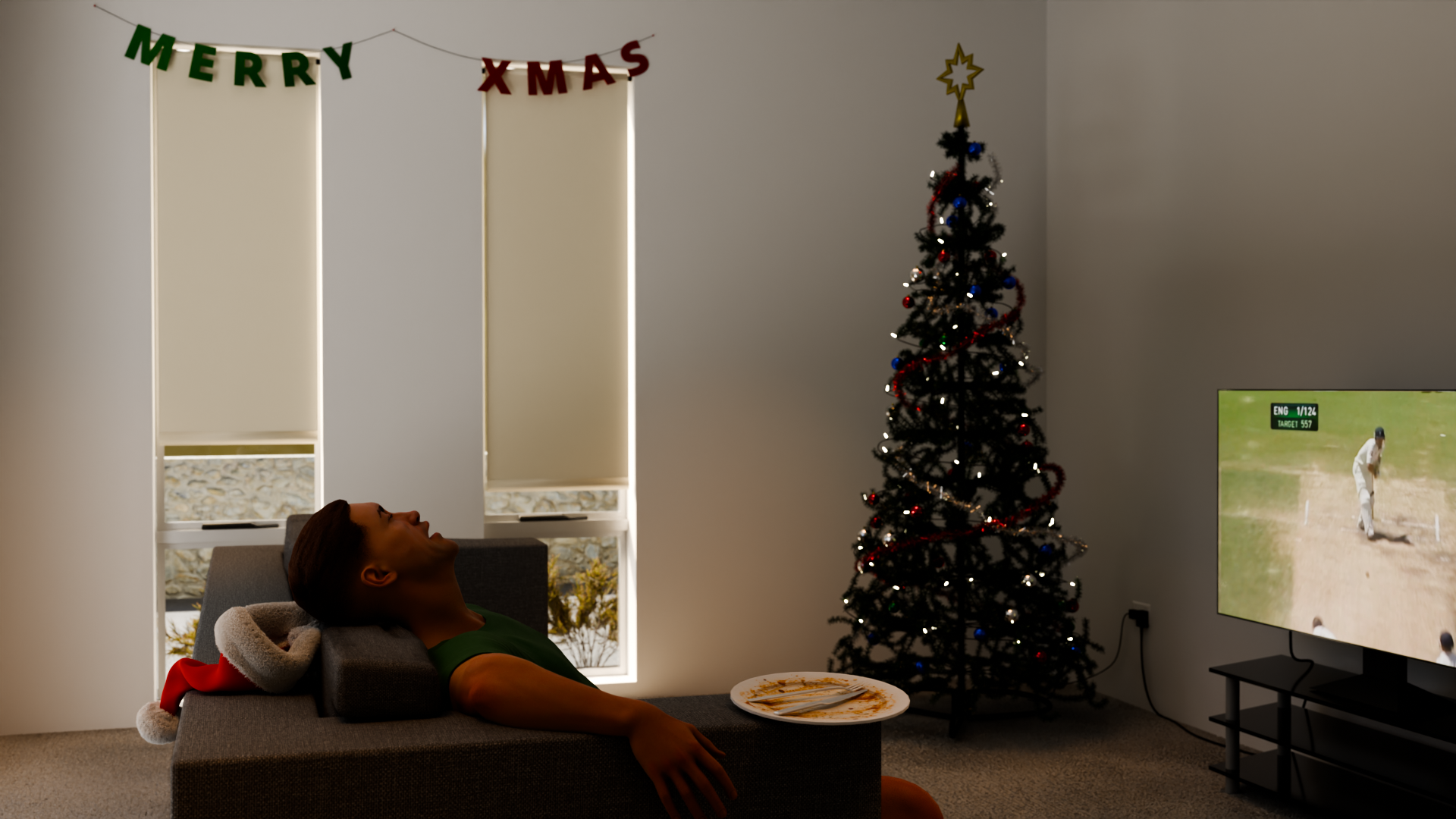
The final shot has some adjustments on the rock wall with a new texture with better scaling, plus some green leafy plants in a garden over the other side of the driveway. This gave a bit more noise and colour out the windows, to constrast with the flat surfaces inside.

At this point I was done with it. I mean, I could do more with it, but I decided to end it there. If I attacked it again I'd add in skirting boards and cornices to make the edges look more realistic. I might add some stuff under the TV.
I had wanted to cue that it was post-Christmas presents with a bunch of wrapping paper on the ground. This is technically difficult! Ripped paper is tricky texture work. Crumpled paper is tricky texture and modelling work. I just didn't have it in me.
What I Learned
I learned a lot about geometry nodes, sculpting and indirect lighting. I feel like my composition and lighting could be a lot, lot better. I have a few books from the Artists' Masters series that I want to learn from.
I think my quick modelling went pretty well. More organic or complicated shapes would be good.
I also learned when to abandon an idea either by scrapping it or saying "that'll do".
Posing humans remains super hard. I think it worked here, but only just.
I have an inkling of an idea taken from struthless and the various artistic November challenges. I want to do a project where I need to make a lot of quick art. One idea I had was the images for a tarot deck, although that's a lot of cards. One per letter of the alphabet might be more achievable.
I haven't got a strong idea of what I want to improve in 3d art for, except for the love of creating and learning a skill.
Where to with Projects?
Last newsletter I teased five projects I was interested in working on. I'll give a rough idea of each here and where I think I'm going to focus next. These descriptions aren't the entirety of what I have thought of for the project - in particular, it doesn't contain plot twists - but give you an idea.
Void Space Pirate Radio
You're an engineer on a spacecraft in deep space. You've been woken up from hypersleep because there's been issues. The rest of your crew remain sleeping and you alone have to fix the ship. The ship is stuck in space, and while you're sending out a distress signal, you try to fight back loneliness by broadcasting pirate radio tunes.
One of the challenges is that various problems are beyond your ken. You can partially wake up the crew, at risk of injuring them. If you wake them up completely you'll likely blast through all your food before rescue. So you make tough decisions all alone in space.
The Submariner
A submarine trip across the Atlantic in a fantasy parallel world. You are an academic returning home via a small submarine piloted by a grizzled ol' sea dog. You spend your days interacting with the other travellers and the environments you pass through, as you wait to be reunited with your lover.
This is meant to be a heavily procedural and systemic game with no two trips the same.
The Death of Alan Watts
A detective mystery set in the hills of San Francisco in the early 1970s amidst a burgeoning counter-culture movement. You're a detective in the SFPD asked to check in on the death of famous local Zen guru, Alan Watts. His death is both very mundane and very odd at the same time. You try to get to the bottom of it.
This is based off the true story of his life and death.
Emerson Sprylock: Gentleman Rascal
I intend this to be the first book of a series of fantasy gamebooks of the adventures of Emerson Sprylock. He's an intelligent, resourceful young man whose goal in life is to join and succeed in the group known as the Epistolary Few. This group share their exploits via group letters, with a sense of one-up-manship and historical importance being their driving force.
This introduces Emerson and the Epistolary Few, and is his first few adventures and escapes as he tries to make a name for himself. He's one part Sherlock Holmes, one part Westley from Princess Bride. I want to do something like the Lone Wolf books, but off on a different tangent than the over-arching war narrative of Joe Dever's books.
Canopic Jar
A horror-comedy-of-errors game designed for EctoComp 2026. You are the bored assistant of the high priests in an ancient Egyptian empire. An accident means that you have to take over the very important role of preparing the recently deceased Pharaoh for the afterlife. It goes as well as you expect.
What say you?
Currently I'm doing some reading and research for The Death of Alan Watts, and have pages of notes for the other projects, but what project are you most interested in?